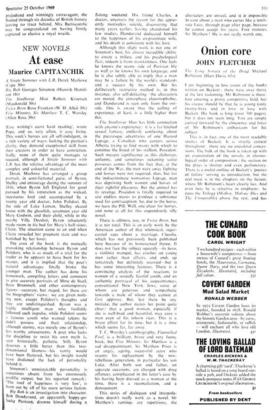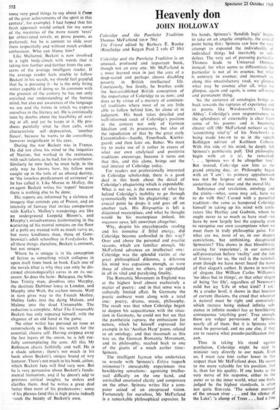Onion core
JOHN FLETCHER
The Long Sonata of the Dead Michael Robinson (Hart-Davis 65s)
am beginning to lose count of the books written on Beckett ; there were over thirty at the last reckoning. Mr Robinson is there- fore entering a pretty competitive field, but his excuse should be that he is young (only twenty-five), and in love- -in love with Beckett. His book is long (over 300 pages). but it does not seem long. You are simply carried forward by the eloquence and force of Mr Robinson's enthusiasm for his subject.
This is, in fact, one of the most readable studies of Beckett. It is strictly critical throughout : there are no anecdotal conces- sions. The bulk of the book is taken up with an examination of the novels, in chrono- logical order of composition ; the section on the plays is shorter and even perfunctory. There is a useful outline of Beckett's 'poetics of failure' serving as introduction, but the real meat is in the chapters on the fiction. where Mr Robinson's heart clearly lies. And even here he is selective in emphasis: he rates the Trilogy (Molloy. Malone Dies and The Unnamable) above the rest, and has some very good things to say about it Coln of the great achievements of the spirit in this century', for example). I had hoped that his fresh approach would unlock for me some of the mysteries of the more recent `texts' (or abbreviated novels, or prose poems, as preferred), but he is content to slide over them respectfully and without much evident enthusiasm. Who can blame him?
Like MaHarm& Beckett is now involved in a tight body-clinch with words that is taking him further and further from the con- cerns of the average intelligent reader. If the average reader feels unable to follow Beckett in his search, we should feel grateful that he is pursuing it—he is the only living writer capable of doing so. In common with the greatest of the century he has not only enriched our understanding of the human mind, but also our awareness of the language we use and the forms in which we express ourselves in the literary act. He is continually torn by doubts about the feasibility of writ- ing at all, and yet he keeps at it. He pro- duces painfully what he then calls, with characteristic self - deprecation, 'another fiasco', because he wants to do something, however insignificant in his eyes.
During the war Beckett was in France. He did not close his mind to the iniquities of Nazism, but worked in the resistance, with such talents as he had, for its overthrow. Similarly he now feels he must help, in the only way he knows how, his fellow men caught up in the toils of an absurd destiny, or 'the issueless predicament of existence' as he has called it. Like Moran in Molloy, the ex-agent Beckett writes his 'report' because there is nothing else to be done.
His reports are informed by a richness of imagery that reminds you of Proust, and an intensity of fantasy that invites comparison with Kafka's. Molloy's wanderings are like an underground Leopold Bloom's, and Murphy's misadventures (culminating in the scattering of his mortal remains on the floor of a pub) are treated with as much verve as, but more kindliness than, those of Gom- browicz's adult schoolboy in Ferdydurke. In all these things, therefore, Beckett is eminent, but not unique.
Where he is unique is in his conception of fiction as something which collapses in upon itself from book to book. Each one of the novels (that is why they can only be dis- cussed chronologically) caves in on its suc- cessor. So does the hero: Belacqua, the bibu- lous Trinity man, dissolves into Murphy, the destitute Dubliner loose in London, and Murphy into Watt, the asylum inmate. Watt in turn gives way to the French Molloy, Molloy fades into the dying Malone, and Malone into the dead Unnamable. The reduction is complete. After The Unnamable Beckett has only repeated himself, with the elegance of an old hand at the game.
No other writer has pursued an issue as remorselessly as Beckett his search for the essential, elusive self. Having stripped away the last layers of the onion, he is left rue- fully contemplating the core. All this Mr Robinson charts faithfully and well. He is a shade solemn ; there's not much in his book about Beckett's unique brand of wry humour. There's not much in his book, either, which Beckett fans will find very new. But he is very persuasive about Beckett's funda- mental humanism, and if he doesn't add to previous critical insights, he orders and clarifies them. And he writes a great deal better than most of his predecessors: some of his phrases (and this is high praise indeed) natch the beauty of Beckett's own.



















































 Previous page
Previous page